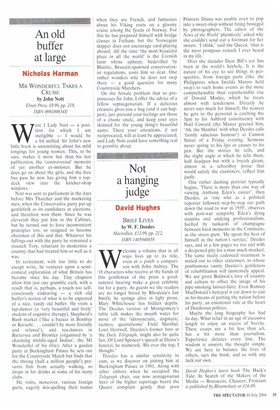Not a hanging judge
David Hughes
BRIEF LIVES by W. F. Deedes Macmillan, £12.99, pp. 212, ISBN 1405040858 Welcome a volume that in all ways lives up to its title, even at a pinch a comparison with John Aubrey. The 18 characters who receive at the hands of this gentleman of the press a goodnatured hearing make a great celebrity list for a party. As guests we the readers are no longer bored by Rhodesia's Ian Smith; he springs alive in light prose. Mary Whitehouse has hidden depths. The Deedes version of Montgomery's table talk makes the mouth water for more of the 'idiosyncratic, dogmatic, tactless, quarrelsome' Field Marshal. Lord Hartwell, Deedes's former boss at the Daily Telegraph, might also be quite fun. Of Lord Spencer's speech at Diana's funeral, he muttered, 'Bit over the top, I thought.'
Deedes has a similar sensitivity to cant, as we discover on joining him at Buckingham Palace in 1981. Along with other editors when he occupied the Telegraph chair, our now nonagenarian hero of the higher reportage heard the Queen complain gently that poor Princess Diana was unable even to pop into a sweet-shop without being besieged by photographers. The editor of the News of the World 'plaintively' asked why she couldn't send out a footman for her sweets. 'I think.' said the Queen, 'that is the most pompous remark I ever heard in my life,'
Over the decades Dear Bill's ear has been at the world's keyhole. It is the nature of his eye to see things in perspective, from foreign parts (like the Philippines when Imelda Marcos held sway) to such home events as the more comprehensible than reprehensible rise of Oswald Mosley, which he treats almost with tenderness. Directly he never says much for himself; the nearest he gets to the personal is catching the 5pm to his Ashford constituency with Noel Coward (the Master greeted him, `Ah, the Member' with what Deedes calls 'faintly salacious humour') at Cannon Street of a Friday evening. Sermons never spring to his lips or causes to his pen. But the stories he tells, and the slight angle at which he tells them, half deadpan but with a boyish gleam, almost in a schoolboy prose that would satisfy the examiners, reflect him justly.
One rather dashing portrait typically begins, 'There is more than one way of viewing Anthony Eden's career', then Deedes, as 'one who as a political reporter followed step-by-step our path down the road to war in 1939', observes with post-war sympathy Eden's dying stamina and undying professionalism, fuelled by tankards of champagne between hard moments in the Commons, as the stress grew. 'He spent the best of himself in the nation's service,' Deedes says, and in a few pages we too end with a deepened pity for a man much mocked. The same nicely cadenced treatment is meted out to other statesmen, to whose posthumous vanity Deedes's gentleness of rehabilitation will immensely appeal. We are given Baldwin's love of country and culture to offset the image of his pipe-smoking laissez-faire. Even Ramsay MacDonald's betrayal is cut down to size as his means of putting the nation before his party, an emotional rule at the heart of Deedesian politics.
Maybe the long biography has had its day. What relief in an age of excessive length to enjoy an excess of brevity. These essays are a bit less than art, but a bit more than journalism. Experience dictates every line. The wisdom is unseen, the thought simple. We are here to balance the lives of others, says the book, and so with any luck our own.
David Hughes's latest book The Hack's Tale: in Search of the Makers of the Media — Boccaccio, Chaucer, Froissart is published by Bloomsbury at £16.99.


























































 Previous page
Previous page